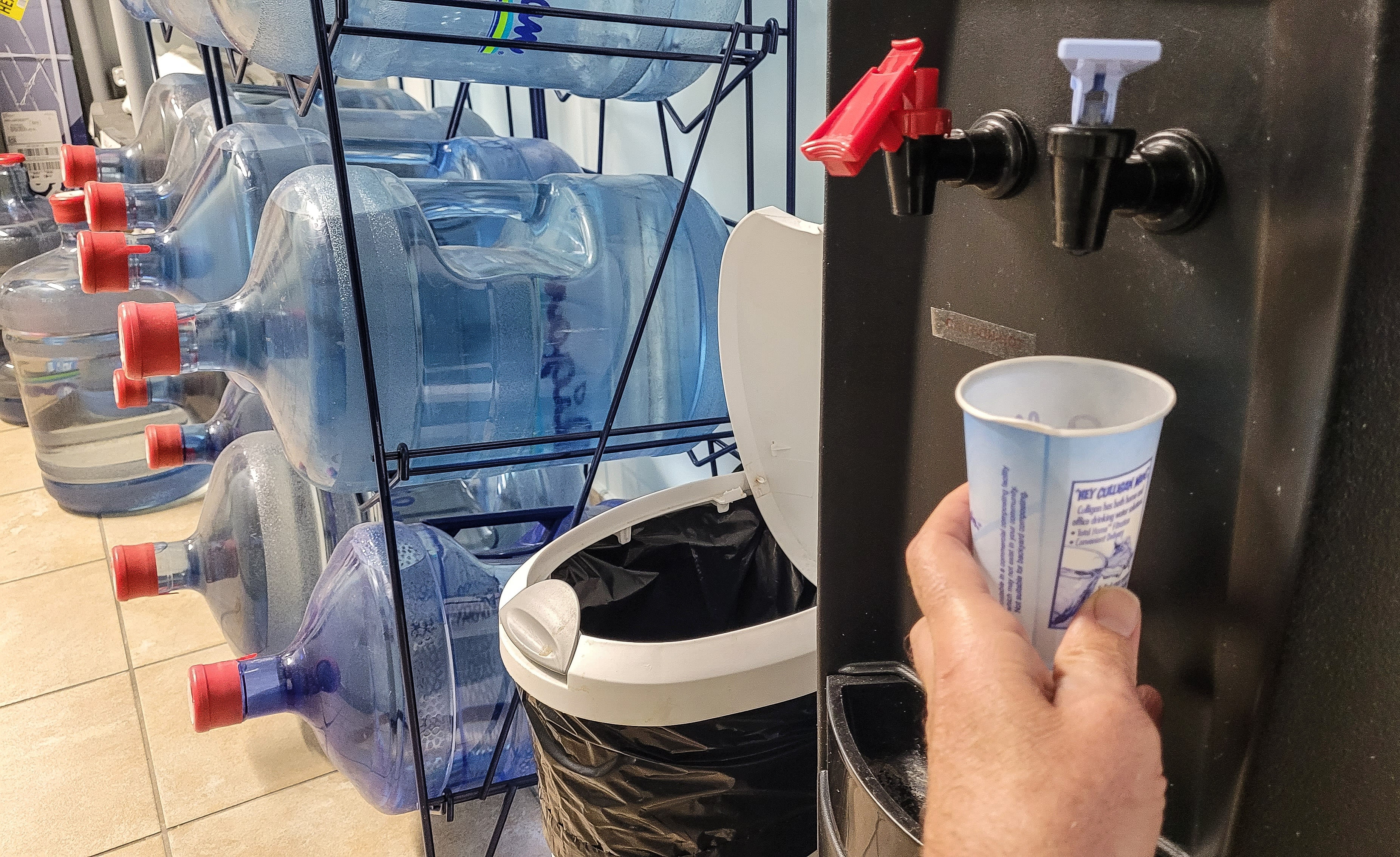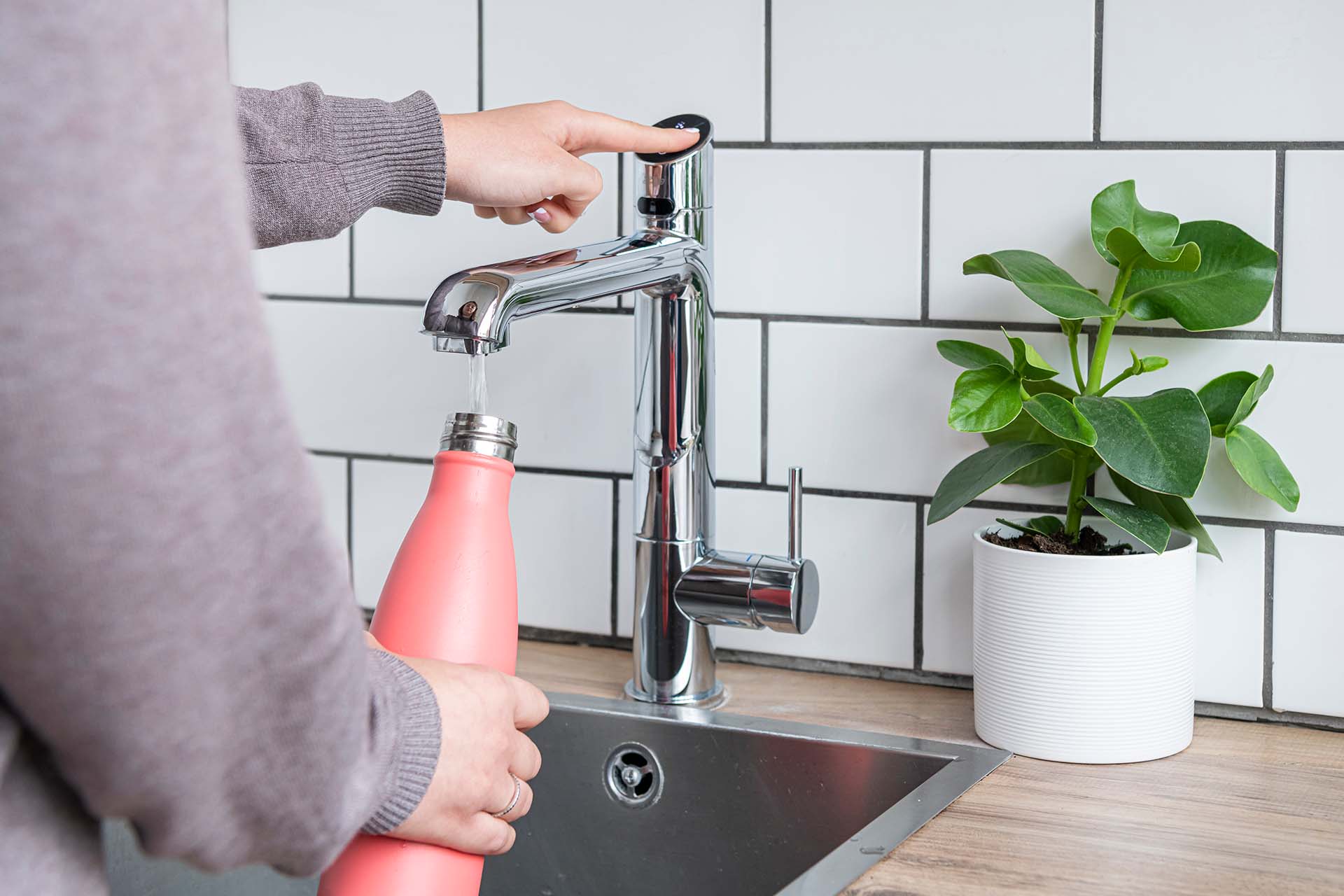Water cooler VS Zip tap: Which is more sustainable
Lily Hedley | June 2, 2025 | 4 minute read

If you’re looking for ways to reduce your office’s carbon footprint, your water setup is a great place to start. Whether you’re choosing a bottled water cooler or a mains-fed tap system like a Zip, Billi or Quooker, the environmental impact can vary significantly.
If you’re trying to figure out the most sustainable water solution for your workplace, you’re in the right place. This guide will walk you through the facts to help you decide.
Water cooler VS water dispenser: What’s the difference?
A water dispenser usually refers to a plumbed-in system that draws directly from the mains supply. These systems filter and dispense water at a range of temperatures, including chilled, boiling, sparkling and ambient. Options range from undercounter taps to freestanding or bar-style units.
A water cooler, while technically a type of dispenser, typically refers to a bottle-fed, freestanding unit. These dispense ambient and cold water and may include a hot tap. The main difference lies in where the water comes from and the variety of water options available. For example, chilled sparkling water is common with mains-fed dispensers but not with bottled coolers.
The problem with bottled water coolers
Many commercial settings still use water coolers that rely on large plastic bottles, typically 19 litres in size.
These bottles are designed to be reused and are collected, cleaned and refilled by suppliers. A single bottle can be reused over 50 times, delivering more than 1,000 litres of water in its lifetime.
That said, there are still clear environmental downsides. Manufacturing these bottles uses significant amounts of oil and water. Transporting the bottles back and forth adds unnecessary emissions. Even when reused, these systems require ongoing logistics that increase your carbon footprint.
By contrast, a mains-fed tap system connects directly to your building’s water supply. That eliminates plastic waste entirely and removes the need for delivery vehicles.

An in-depth look at the impact of water coolers
Plastic pollution
Plastic is the most obvious problem. Even though bottles are reused, they don’t last forever. Once retired, many end up in landfill. This plastic footprint is entirely avoidable if you switch to a mains-fed system.
Resource depletion
Making and maintaining a bottled water system takes energy. It requires oil, water and materials to manufacture, clean and transport the bottles. It also relies on constant vehicle use to deliver and collect them.
Carbon emissions
Transporting heavy water bottles creates a large amount of avoidable greenhouse gas emissions. It’s far more carbon-efficient to filter and dispense water on site. Compared with a mains-fed water dispenser, the delivery model of bottled coolers significantly increases your office’s emissions.
Potential health concerns
Some research suggests that certain types of plastic, like those that contain BPA, may leach into water over time. This is less of a sustainability issue and more of a workplace wellness one, but it’s worth keeping in mind if you’re reviewing long-term options.
How can an automatic water dispenser help?
Installing a plumbed-in tap system gives your team filtered water at a range of temperatures. There are even models that add sparkling water as an option. There’s no plastic, no deliveries and no waste.
These systems also make it easier for people to stay hydrated, which supports energy levels, focus and overall wellbeing.

Why sustainability matters to your team too
It’s not just about operational efficiency. More people want to work for and support companies that care about their environmental impact.In fact, 69% of consumers prefer reusable drink solutions in 2025 . This growing expectation around sustainability is something your team and your clients will notice.
Choosing a mains-fed tap shows that your business is reducing waste and thinking long-term.
Extra environmental benefits
- Lower energy use- Mains-fed taps use less energy than kettles and save time by delivering instant hot water.
- Encourage reuse- Support your team with branded reusable bottles or mugs to help reduce single-use waste further.
- Eco-friendly filtration- Look for systems with sustainable filters or recyclable cartridges. Your supplier should be able to advise you.
Final thoughts
Every workplace should be looking for practical ways to operate more sustainably. Switching from a bottled water cooler to a plumbed-in tap is one of the simplest changes with the biggest impact.
If you’re ready to explore your options, we can help you find the right solution for your space and team.